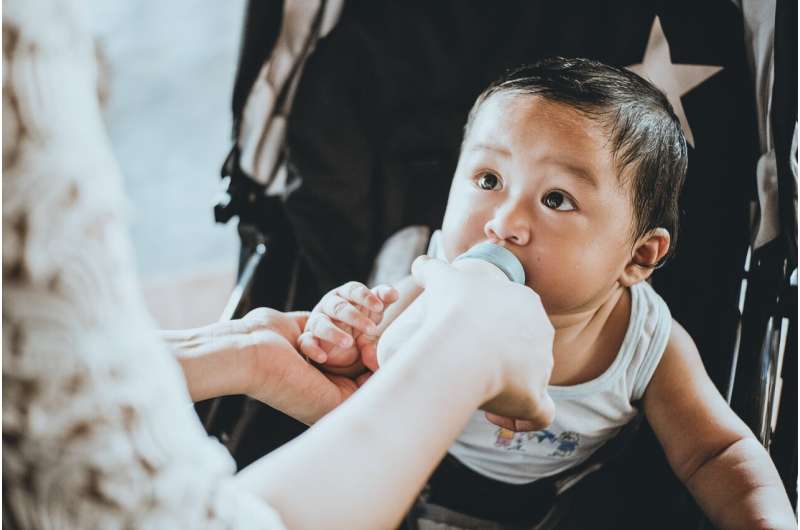This article has been reviewed according to Science X's editorial process and policies. Editors have highlighted the following attributes while ensuring the content's credibility:
fact-checked
trusted source
proofread
Study raises concerns over powdered infant formula preparation machines

A study by Swansea University academics into powdered infant formula preparation safety has revealed that 85% of the 74 infant formula preparation machines tested by parents in UK homes did not appear to produce water that would be hot enough to kill all harmful bacteria in infant formula, and this could pose a serious risk to infant health.
This was compared to 69 parents in the study who used a kettle to heat the water used to prepare infant formula, where 22% reported water temperatures that were not hot enough to kill all harmful bacteria. The study is published in the Maternal & Child Nutrition journal.
Almost three quarters of infants in the UK are fed infant formula in the first six weeks of life and this rises to 88% by six months of age.
Formula-fed infants have a higher risk of gastrointestinal infections compared to breastfed infants1 which can be attributed, in part, to bacterial contamination from: the powdered infant formula itself (which cannot be made sterile), the equipment used for feeding, and also preparing infant formula with unclean hands. To help reduce the risk of such infections, the NHS has adopted the World Health Organization (WHO) recommendation that water used to make infant formula should be boiled and cooled, so that it is at a temperature of at least 70°C to eliminate bacteria.
The study, which explored the safety of infant formula preparation practices compared to NHS guidelines, used community science methods and involved parents of infants aged 12 months or under. Around half of the 143 parents (74 people) used infant formula preparation machines while the remaining 69 parents used kettles to boil the water for infant formula preparation.
Dr. Aimee Grant, senior lecturer in public health, who led the study said, "I was concerned to find that of the 74 infant formula preparation machines tested by parents, 85% appeared to fail to reach a temperature of at least 70°C, which the NHS say is needed to kill all bacteria that can live in powdered infant formula."
"If any parents are worried, I'd advise them to buy a food thermometer and test the temperature of just the hot water that comes out of their machine (but not to use this tested water in a feed, due to potential contamination); if it's below 70°, do not use the machine to prepare infant formula and contact the machine manufacturer."
Jonie Cooper, a parent who took part in the study, said, "When I first tested my prep machine, using the setting for a four-ounce bottle of formula, I got a temperature of 52°C. When I saw this I was shocked because I trusted the machine to follow the NHS guidelines on the temperature of the water, because it was specifically designed for babies. I advise parents using a prep machine to check the temperature of the water."
The study recommends stronger consumer protections on the marketing of infant formula preparation devices to help protect infants from infant formula related bacterial contamination. It is important that formula is prepared as per NHS guidance to avoid risks from contamination which can result in serious illness and even death.
Researchers are calling for infant formula labeling requirements to be updated to align with NHS and WHO guidance by displaying information that powdered infant formula is not sterile, the optimal water temperature and the risks of not using sufficiently hot water while also stating the importance of hand washing and routinely sterilizing all feeding equipment.
The study also recommends that these public health messages should be shared in the course of antenatal and postnatal infant feeding support, following UNICEF Baby Friendly Initiative guidance. Finally, the research team advises that bacterial gastrointestinal infections in infants, particularly those resulting in hospitalization, should be mapped to batches of infant formula and associated preparation equipment to provide information that could inform measures to improve the safety of formula feeding practices for babies in the UK.
Professor Robin May, chief scientific advisor at the FSA said, "The findings of this project emphasize the importance of checking that water used to prepare infant formula is at a temperature of at least 70°C, regardless of the method used. In light of these findings, we recommend that consumers check the water dispensed by infant formula preparation machines is at least 70°C and, if that is not the case, they should contact the manufacturer, their local Trading Standards Department or Citizens Advice."
"The FSA is working closely with other partners including the Office for Product Safety and Standards to determine whether any further actions are required."
More information: Aimee Grant et al, The safety of at home powdered infant formula preparation: A community science project, Maternal & Child Nutrition (2023). DOI: 10.1111/mcn.13567




















